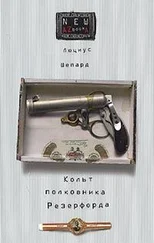Mingolla was surprised to hear his thoughts echoed by someone who so resembled a hominid.
“I come here,” the boy went on. “I listen to the wind, hear it sing in the iron. And I know t’ings from it. I can see the future.” He grinned, exposing blackened teeth, and pointed south toward the Caribbean. “Future’s that way, man.”
Mingolla liked the joke; he felt an affinity for the boy, for anyone who could manage jokes from the boy’s perspective, but he couldn’t think of a way to express his good feeling. Finally he said, “You speak English well.”
“Shit! What you think? ‘Cause we live in the jungle, we talk like animals? Shit!” The boy jabbed the point of his knife into the concrete. “I talk English all my life. Gringos they too stupid to learn Spanish.”
A girl’s voice sounded behind them, harsh and peremptory. The other children had closed to within ten feet, their savage faces intent upon Mingolla, and the girl was standing a bit forward of them. She had sunken cheeks and deep-set eyes; ratty cables of hair hung down over her single-scoop breasts. Her hipbones tented up a rag of a skirt, which the wind pushed back between her legs. The boy let her finish, then gave a prolonged response, punctuating his words by smashing the brass-knuckle grip of his knife against the concrete, striking sparks with every blow.
“Gracela,” he said to Mingolla, “she wants to kill you. But I say, some men they got one foot in the worl’ of death, and if you kill them, death will take you, too. And you know what?”
“What?” said Mingolla.
“It’s true. You and death”—the boy clasped his hands—“like this.”
“Maybe,” Mingolla said.
“No ‘maybe.’ The bridge tol’ me. Tol’ me I be t’ankful if I let you live. So you be t’ankful to the bridge. That magic you don’ believe, it save your ass.” The boy lowered out of his squat and sat crosslegged. “Gracela, she don’ care ’bout you live or die. She jus’ go ‘gainst me ’cause when I leave here, she going to be chief. She’s, you know, impatient.”
Mingolla looked at the girl. She met his gaze coldly: a witch-child with slitted eyes, bramble hair, and ribs poking out. “Where are you going?” he asked the boy.
“I have a dream I will live in the south; I dream I own a warehouse full of gold and cocaine.”
The girl began to harangue him again, and he shot back a string of angry syllables.
“What did you say?” Mingolla asked.
“I say,” Gracela, you give me shit, I going to fuck you and t’row you in the river.’ “ He winked at Mingolla. “Gracela she a virgin, so she worry ’bout that firs’ t’ing.”
The sky was graying, pink streaks fading in from the east; birds wheeled up from the jungle below, forming into flocks above the river. In the half-light Mingolla saw that the boy’s chest was cross-hatched with ridged scars: knife wounds that hadn’t received proper treatment. Bits of vegetation were trapped in his hair, like primitive adornments.
“Tell me, gringo,” said the boy. “I hear in America there is a machine wit’ the soul of a man. This is true?”
“More or less,” said Mingolla.
The boy nodded gravely, his suspicions confirmed. “I hear also America has builded a metal worl’ in the sky.”
“They’re building it now.”
“In the house of your president, is there a stone that holds the mind of a dead magician?”
Mingolla gave this due consideration. “I doubt it,” he said. “But it’s possible.”
Wind thudded against the bridge, startling him. He felt its freshness on his face and relished the sensation. That—the fact that he could still take simple pleasure from life—startled him more than had the sudden noise.
The pink streaks in the east were deepening to crimson and fanning wider; shafts of light pierced upward to stain the bellies of some lowlying clouds to mauve. Several of the children began to mutter in unison. A chant. They were speaking in Spanish, but the way their voices jumbled the words, it sounded guttural and malevolent, a language for trolls. Listening to them, Mingolla imagined them crouched around fires in bamboo thickets. Bloody knives lifted sunwards over their fallen prey. Making love in the green nights among fleshy Rousseau-like vegetation, while pythons with ember eyes coiled in the branches above their heads.
“Truly, gringo,” said the boy, apparently still contemplating Mingolla’s answers. “These are evil times.” He stared gloomily down at the river; the wind shifted the heavy snarls of his hair.
Watching him, Mingolla grew envious. Despite the bleakness of his existence, this little monkey king was content with his place in the world, assured of its nature. Perhaps he was deluded, but Mingolla envied his delusion, and he especially envied his dream of gold and cocaine. His own dreams had been dispersed by the war. The idea of sitting and daubing colors onto canvas no longer held any real attraction for him. Nor did the thought of returning to New York. Though survival had been his priority all these months, he had never stopped to consider what survival portended, and now he did not believe he could return. He had, he realized, become acclimated to the war, able to breathe its toxins; he would gag on the air of peace and home. The war was his new home, his newly rightful place.
Then the truth of this struck him with the force of an illumination, and he understood what he had to do.
Baylor and Gilbey had acted according to their natures, and he would have to act according to his, which imposed upon him the path of acceptance. He remembered Tio Moises’ story about the pilot and laughed inwardly. In a sense his friend—the guy he had mentioned in his unsent letter—had been right about the war, about the world. It was full of designs, patterns, coincidences, and cycles that appeared to indicate the workings of some magical power. But these things were the result of a subtle natural process. The longer you lived, the wider your experience, the more complicated your life became, and eventually you were bound in the midst of so many interactions, a web of circumstance and emotion and event, that nothing was simple anymore and everything was subject to interpretation. Interpretation, however, was a waste of time. Even the most logical of interpretations was merely an attempt to herd mystery into a cage and lock the door on it. It made life no less mysterious. And it was equally pointless to seize upon patterns, to rely on them, to obey the mystical regulations they seemed to imply. Your one effective course had to be entrenchment. You had to admit to mystery, to the incomprehensibility of your situation, and protect yourself against it. Shore up your web, clear it of blind corners, set alarms. You had to plan aggressively. You had to become the monster in your own maze, as brutal and devious as the fate you sought to escape. It was the kind of militant acceptance that Tio Moises’ pilot had not had the opportunity to display, that Mingolla himself—though the opportunity had been his—had failed to display. He saw that now. He had merely reacted to danger and had not challenged or used forethought against it. But he thought he would be able to do that now.
He turned to the boy, thinking he might appreciate this insight into “magic,” and caught a flicker of movement out of the corner of his eye. Gracela. Coming up behind the boy, her knife held low, ready to stab. In reflex, Mingolla flung out his injured hand to block her. The knife nicked the edge of his hand, deflected upward and sliced the top of the boy’s shoulder.
The pain in Mingolla’s hand was excruciating, blinding him momentarily; and then as he grabbed Gracela’s forearm to prevent her from stabbing again, he felt another sensation, one almost covered by the pain. He had thought the thing inside his hand was dead, but now he could feel it fluttering at the edges of the wound, leaking out in the rich trickle of blood that flowed over his wrist. It was trying to worm back inside, wriggling against the flow, but the pumping of his heart was too strong, and soon it was gone, dripping on the white stone of the bridge.
Читать дальше






